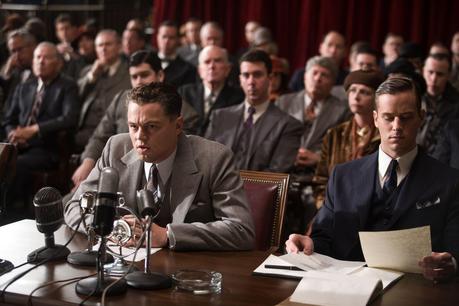 Photo: Keith Bernstein
Photo: Keith BernsteinDirected by Clint Eastwood. Starring Leonardo DiCaprio, Armie Hammer, Naomi Watts and Judi Dench. 137 minutes. PG
For a film about a man that tightly controlled his message, J. Edgar doesn’t really know what it’s trying to say.
Clint Eastwood’s latest directorial effort has us traveling back and forth through the life of J. Edgar Hoover (Leonardo DiCaprio), the controversial and mysterious former director of the FBI. The film spans 50 years, following his rise from a twenty-something Justice Department employee obsessed with Bolsheviks and bomb-loving radicals to his fastidious creation and dictatorship of the Bureau.
Hoover is both corrupt and honorable at the same time, suspicious of everyone and everything but his country, which he dedicates his life to protecting. He modernizes the bureau (think finger printing, databases and evidence analysis) and is consumed by his public image, spending money to develop comic books about the G-Man and staging arrests for the press.
But for all his successes, Hoover is a deeply insecure man. He stutters when uncomfortable, rages when threatened and spies his way through the terms of eight elected presidents.
He collects secrets, keeping confidential files on everyone from John F. Kennedy to Martin Luther King Jr., and ruthlessly blackmails those who pose a threat to him and his bureau—though they’re one and the same to him.
He places his trust in only three people: his loyal secretary, Helen Gandy (Naomi Watts); his controlling yet doting mother, Annie Hoover (Judi Dench); and his rumoured love interest and life-long companion, Clyde Tolson (Armie Hammer). It is around these three characters that Hoover rises to become of the most powerful and hated men in America.
Hoover’s legend is chock-full of rumours and potential plot lines: Cross-dressing. Homosexuality. Excessive paranoia.
The problem is that the film is so noncommittal to any of them that the audience doesn’t get a chance to commit to anything. Do we hate Hoover? Not really, he was an outsider who had the ego, power and smarts to protect himself against his enemies. But we don’t love him either. That’s probably why passing nods at those aspects of Hoover’s more salacious legacy feel forced and contrived.
DiCaprio, reminiscent of himself as Howard Hughes in The Aviator, gives us everything we expect from the actor: a finely executed drawl, studied character flaws and a captivating performance. But it’s really the film’s non-linear, non-chronological structure that holds it together, giving the audience something to be excited about as we insert into different stages of Hoover’s journey. The pacing, however, varies too much between the two halves of the film, blazing into the first scene with a tenacity that disappears in the latter part.
Most disappointing is the prosthetic latex makeup used to age the actors, especially Armie Hammer, whose performance is severely affected by the makeup department. Even Naomi Watts, who plays a subtle but solid role, looks too much like Helen Mirren for us to focus on her contribution.
It’s not that J.Edgar has a bad plot. It has the beginnings of a lot of plots, none that are thoroughly explored. It’s that lack of thoroughness that leaves you unsettled throughout the film and waiting for more. C+
 By Jelena Djurkic
By Jelena DjurkicDream cast: Helen Hunt, Kate Winslet, Jodie Foster and David Duchovny (but only if he gets to yell out "Scully!")

